Technology vs Ethics: Catastrophe in the Film '28 Days Later' Analysis
VerifiedAdded on 2023/06/04
|5
|1062
|78
Essay
AI Summary
This essay analyzes the film '28 Days Later' to explore the complex relationship between technology and ethics, focusing on the catastrophic consequences that arise when ethical considerations are disregarded. The film depicts a scenario where scientific advancements, specifically the creation of a rage-inducing virus, lead to widespread devastation due to unethical experimentation and a lack of responsible oversight. The analysis delves into the motives of the scientists and the actions of animal rights activists, highlighting how the pursuit of technological progress without ethical boundaries can result in disastrous outcomes, mirroring real-world concerns about the potential dangers of unchecked scientific ambition. The essay concludes by emphasizing the critical importance of ethical considerations in technological development to prevent future catastrophes and ensure the responsible use of scientific advancements, with the film serving as a cautionary tale.
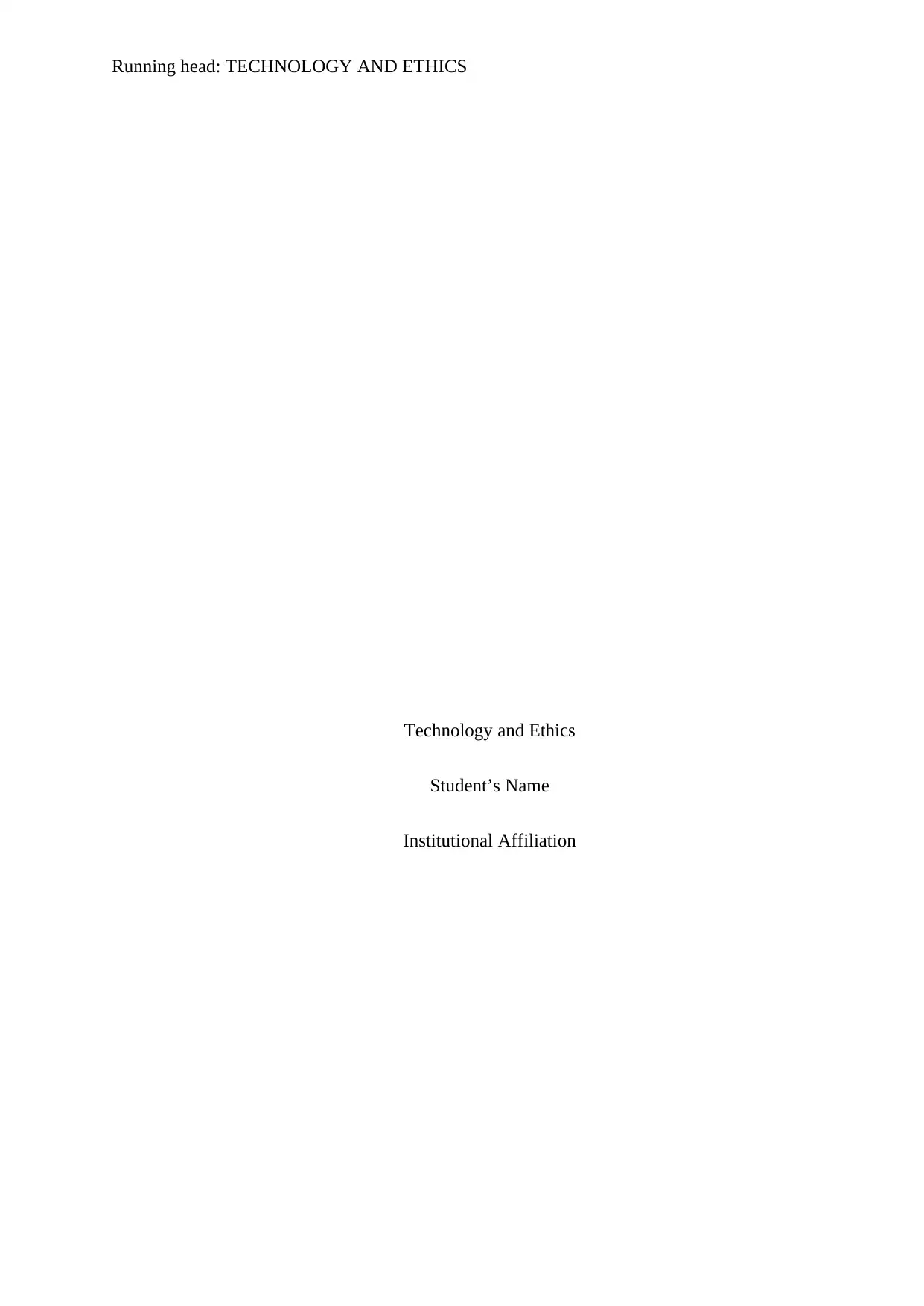
Running head: TECHNOLOGY AND ETHICS
Technology and Ethics
Student’s Name
Institutional Affiliation
Technology and Ethics
Student’s Name
Institutional Affiliation
Paraphrase This Document
Need a fresh take? Get an instant paraphrase of this document with our AI Paraphraser
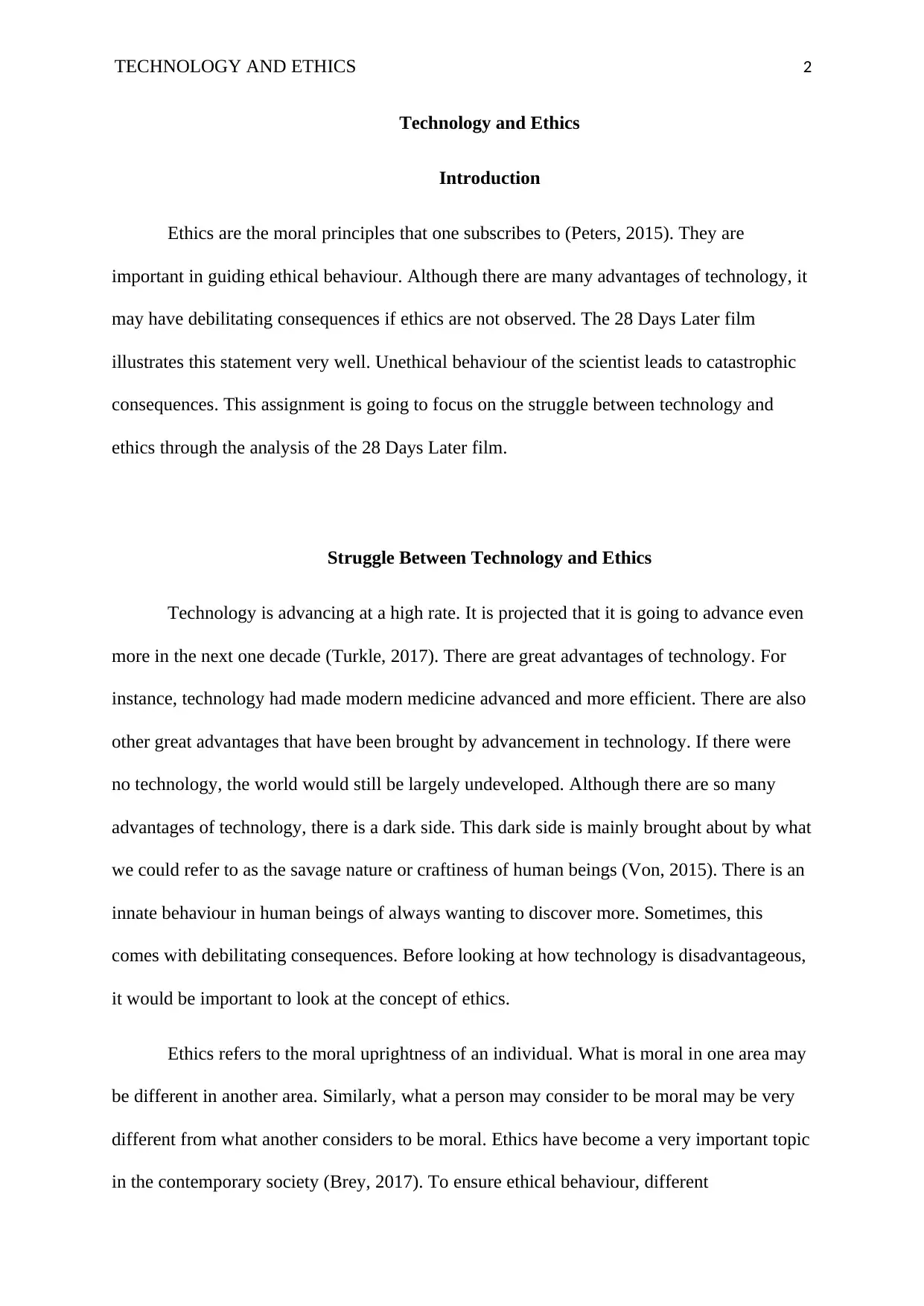
TECHNOLOGY AND ETHICS 2
Technology and Ethics
Introduction
Ethics are the moral principles that one subscribes to (Peters, 2015). They are
important in guiding ethical behaviour. Although there are many advantages of technology, it
may have debilitating consequences if ethics are not observed. The 28 Days Later film
illustrates this statement very well. Unethical behaviour of the scientist leads to catastrophic
consequences. This assignment is going to focus on the struggle between technology and
ethics through the analysis of the 28 Days Later film.
Struggle Between Technology and Ethics
Technology is advancing at a high rate. It is projected that it is going to advance even
more in the next one decade (Turkle, 2017). There are great advantages of technology. For
instance, technology had made modern medicine advanced and more efficient. There are also
other great advantages that have been brought by advancement in technology. If there were
no technology, the world would still be largely undeveloped. Although there are so many
advantages of technology, there is a dark side. This dark side is mainly brought about by what
we could refer to as the savage nature or craftiness of human beings (Von, 2015). There is an
innate behaviour in human beings of always wanting to discover more. Sometimes, this
comes with debilitating consequences. Before looking at how technology is disadvantageous,
it would be important to look at the concept of ethics.
Ethics refers to the moral uprightness of an individual. What is moral in one area may
be different in another area. Similarly, what a person may consider to be moral may be very
different from what another considers to be moral. Ethics have become a very important topic
in the contemporary society (Brey, 2017). To ensure ethical behaviour, different
Technology and Ethics
Introduction
Ethics are the moral principles that one subscribes to (Peters, 2015). They are
important in guiding ethical behaviour. Although there are many advantages of technology, it
may have debilitating consequences if ethics are not observed. The 28 Days Later film
illustrates this statement very well. Unethical behaviour of the scientist leads to catastrophic
consequences. This assignment is going to focus on the struggle between technology and
ethics through the analysis of the 28 Days Later film.
Struggle Between Technology and Ethics
Technology is advancing at a high rate. It is projected that it is going to advance even
more in the next one decade (Turkle, 2017). There are great advantages of technology. For
instance, technology had made modern medicine advanced and more efficient. There are also
other great advantages that have been brought by advancement in technology. If there were
no technology, the world would still be largely undeveloped. Although there are so many
advantages of technology, there is a dark side. This dark side is mainly brought about by what
we could refer to as the savage nature or craftiness of human beings (Von, 2015). There is an
innate behaviour in human beings of always wanting to discover more. Sometimes, this
comes with debilitating consequences. Before looking at how technology is disadvantageous,
it would be important to look at the concept of ethics.
Ethics refers to the moral uprightness of an individual. What is moral in one area may
be different in another area. Similarly, what a person may consider to be moral may be very
different from what another considers to be moral. Ethics have become a very important topic
in the contemporary society (Brey, 2017). To ensure ethical behaviour, different
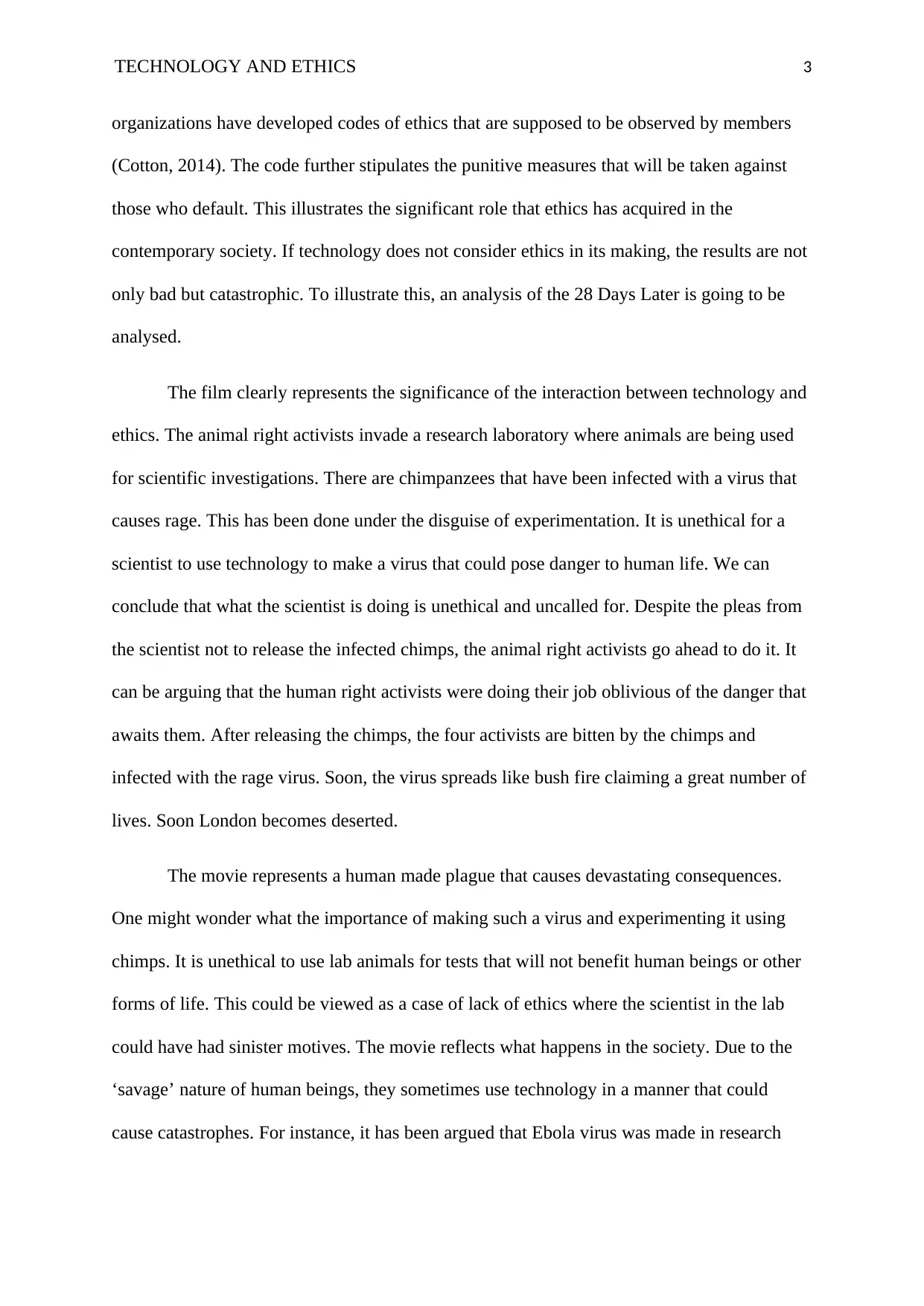
TECHNOLOGY AND ETHICS 3
organizations have developed codes of ethics that are supposed to be observed by members
(Cotton, 2014). The code further stipulates the punitive measures that will be taken against
those who default. This illustrates the significant role that ethics has acquired in the
contemporary society. If technology does not consider ethics in its making, the results are not
only bad but catastrophic. To illustrate this, an analysis of the 28 Days Later is going to be
analysed.
The film clearly represents the significance of the interaction between technology and
ethics. The animal right activists invade a research laboratory where animals are being used
for scientific investigations. There are chimpanzees that have been infected with a virus that
causes rage. This has been done under the disguise of experimentation. It is unethical for a
scientist to use technology to make a virus that could pose danger to human life. We can
conclude that what the scientist is doing is unethical and uncalled for. Despite the pleas from
the scientist not to release the infected chimps, the animal right activists go ahead to do it. It
can be arguing that the human right activists were doing their job oblivious of the danger that
awaits them. After releasing the chimps, the four activists are bitten by the chimps and
infected with the rage virus. Soon, the virus spreads like bush fire claiming a great number of
lives. Soon London becomes deserted.
The movie represents a human made plague that causes devastating consequences.
One might wonder what the importance of making such a virus and experimenting it using
chimps. It is unethical to use lab animals for tests that will not benefit human beings or other
forms of life. This could be viewed as a case of lack of ethics where the scientist in the lab
could have had sinister motives. The movie reflects what happens in the society. Due to the
‘savage’ nature of human beings, they sometimes use technology in a manner that could
cause catastrophes. For instance, it has been argued that Ebola virus was made in research
organizations have developed codes of ethics that are supposed to be observed by members
(Cotton, 2014). The code further stipulates the punitive measures that will be taken against
those who default. This illustrates the significant role that ethics has acquired in the
contemporary society. If technology does not consider ethics in its making, the results are not
only bad but catastrophic. To illustrate this, an analysis of the 28 Days Later is going to be
analysed.
The film clearly represents the significance of the interaction between technology and
ethics. The animal right activists invade a research laboratory where animals are being used
for scientific investigations. There are chimpanzees that have been infected with a virus that
causes rage. This has been done under the disguise of experimentation. It is unethical for a
scientist to use technology to make a virus that could pose danger to human life. We can
conclude that what the scientist is doing is unethical and uncalled for. Despite the pleas from
the scientist not to release the infected chimps, the animal right activists go ahead to do it. It
can be arguing that the human right activists were doing their job oblivious of the danger that
awaits them. After releasing the chimps, the four activists are bitten by the chimps and
infected with the rage virus. Soon, the virus spreads like bush fire claiming a great number of
lives. Soon London becomes deserted.
The movie represents a human made plague that causes devastating consequences.
One might wonder what the importance of making such a virus and experimenting it using
chimps. It is unethical to use lab animals for tests that will not benefit human beings or other
forms of life. This could be viewed as a case of lack of ethics where the scientist in the lab
could have had sinister motives. The movie reflects what happens in the society. Due to the
‘savage’ nature of human beings, they sometimes use technology in a manner that could
cause catastrophes. For instance, it has been argued that Ebola virus was made in research
⊘ This is a preview!⊘
Do you want full access?
Subscribe today to unlock all pages.

Trusted by 1+ million students worldwide
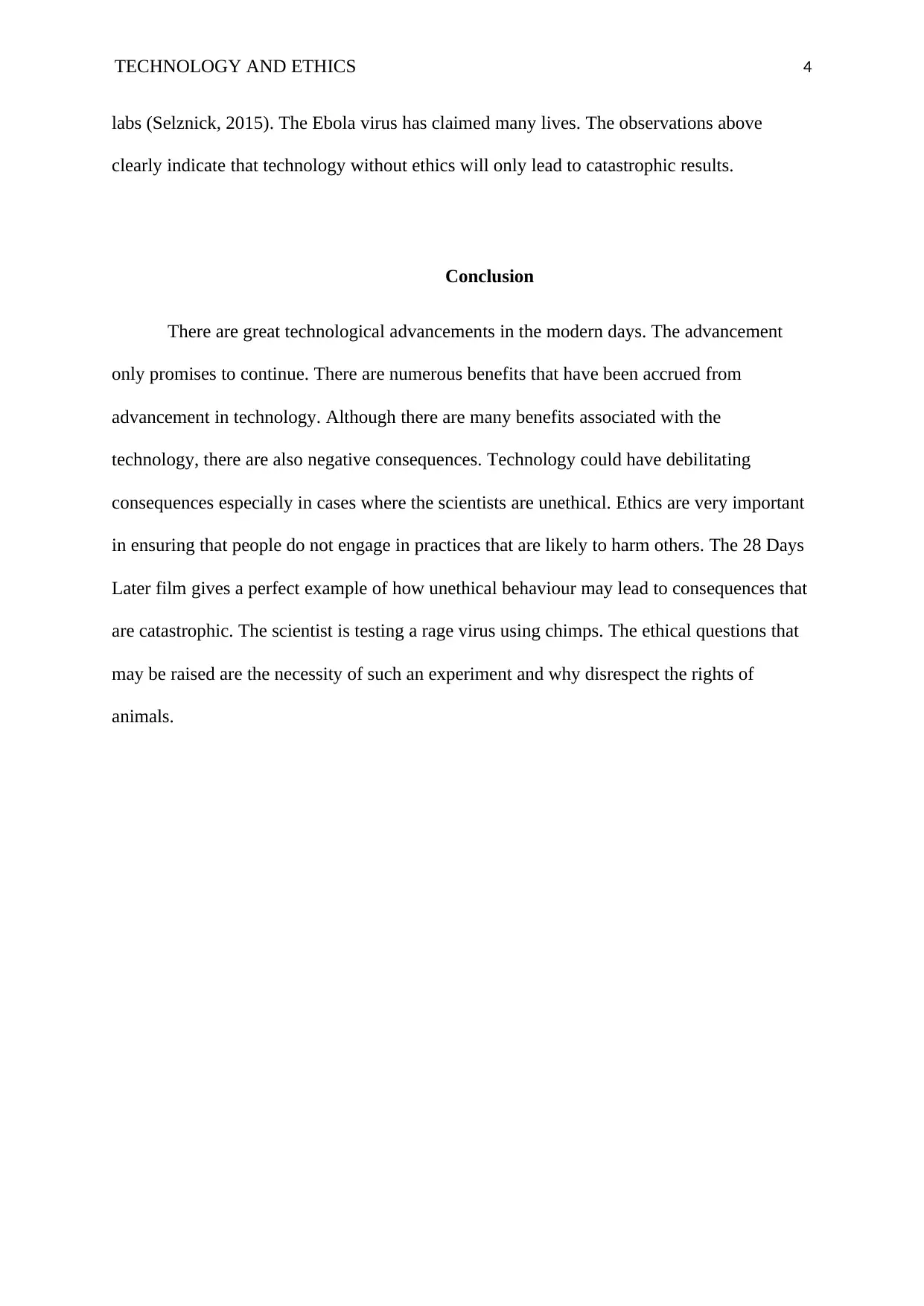
TECHNOLOGY AND ETHICS 4
labs (Selznick, 2015). The Ebola virus has claimed many lives. The observations above
clearly indicate that technology without ethics will only lead to catastrophic results.
Conclusion
There are great technological advancements in the modern days. The advancement
only promises to continue. There are numerous benefits that have been accrued from
advancement in technology. Although there are many benefits associated with the
technology, there are also negative consequences. Technology could have debilitating
consequences especially in cases where the scientists are unethical. Ethics are very important
in ensuring that people do not engage in practices that are likely to harm others. The 28 Days
Later film gives a perfect example of how unethical behaviour may lead to consequences that
are catastrophic. The scientist is testing a rage virus using chimps. The ethical questions that
may be raised are the necessity of such an experiment and why disrespect the rights of
animals.
labs (Selznick, 2015). The Ebola virus has claimed many lives. The observations above
clearly indicate that technology without ethics will only lead to catastrophic results.
Conclusion
There are great technological advancements in the modern days. The advancement
only promises to continue. There are numerous benefits that have been accrued from
advancement in technology. Although there are many benefits associated with the
technology, there are also negative consequences. Technology could have debilitating
consequences especially in cases where the scientists are unethical. Ethics are very important
in ensuring that people do not engage in practices that are likely to harm others. The 28 Days
Later film gives a perfect example of how unethical behaviour may lead to consequences that
are catastrophic. The scientist is testing a rage virus using chimps. The ethical questions that
may be raised are the necessity of such an experiment and why disrespect the rights of
animals.
Paraphrase This Document
Need a fresh take? Get an instant paraphrase of this document with our AI Paraphraser
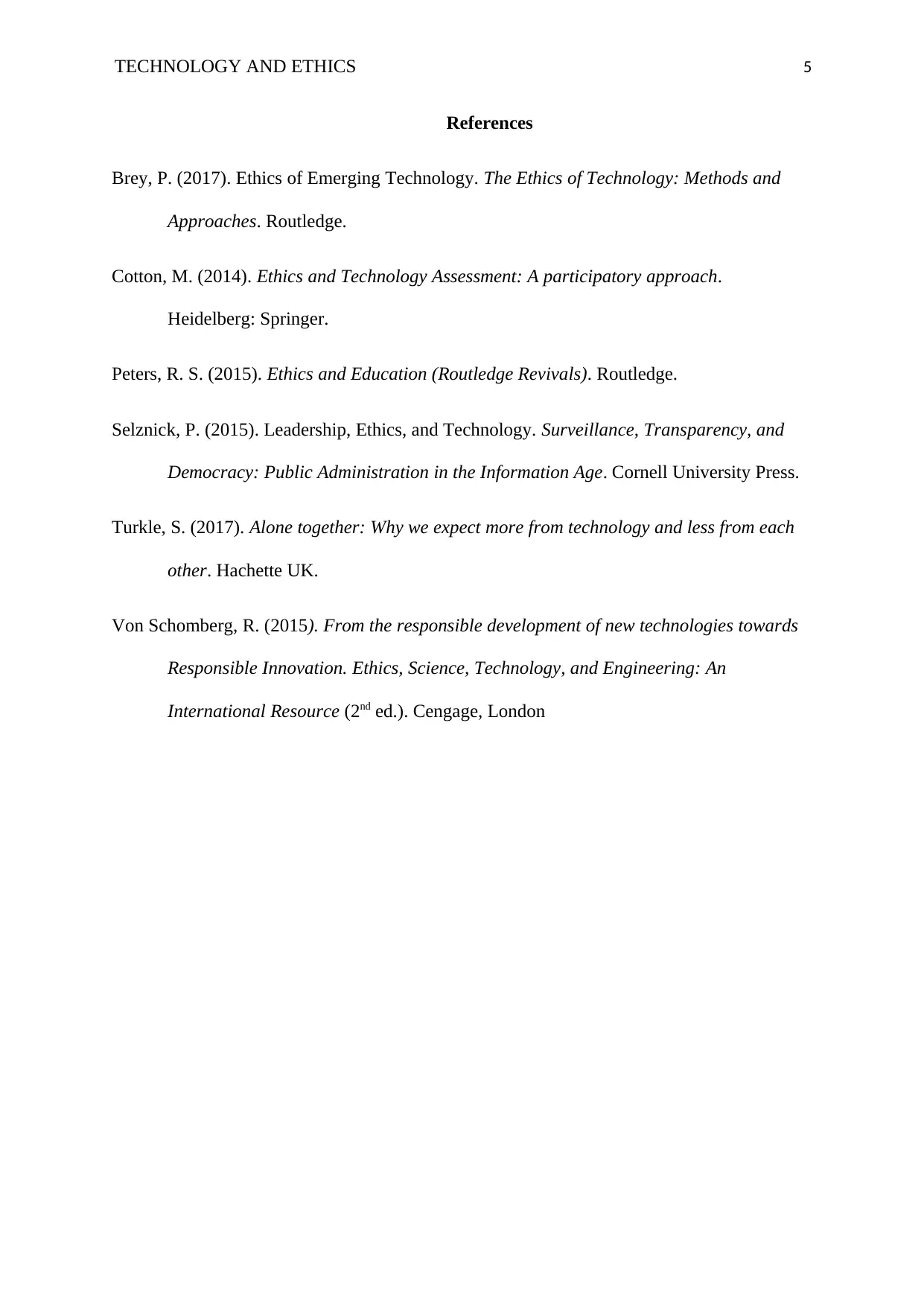
TECHNOLOGY AND ETHICS 5
References
Brey, P. (2017). Ethics of Emerging Technology. The Ethics of Technology: Methods and
Approaches. Routledge.
Cotton, M. (2014). Ethics and Technology Assessment: A participatory approach.
Heidelberg: Springer.
Peters, R. S. (2015). Ethics and Education (Routledge Revivals). Routledge.
Selznick, P. (2015). Leadership, Ethics, and Technology. Surveillance, Transparency, and
Democracy: Public Administration in the Information Age. Cornell University Press.
Turkle, S. (2017). Alone together: Why we expect more from technology and less from each
other. Hachette UK.
Von Schomberg, R. (2015). From the responsible development of new technologies towards
Responsible Innovation. Ethics, Science, Technology, and Engineering: An
International Resource (2nd ed.). Cengage, London
References
Brey, P. (2017). Ethics of Emerging Technology. The Ethics of Technology: Methods and
Approaches. Routledge.
Cotton, M. (2014). Ethics and Technology Assessment: A participatory approach.
Heidelberg: Springer.
Peters, R. S. (2015). Ethics and Education (Routledge Revivals). Routledge.
Selznick, P. (2015). Leadership, Ethics, and Technology. Surveillance, Transparency, and
Democracy: Public Administration in the Information Age. Cornell University Press.
Turkle, S. (2017). Alone together: Why we expect more from technology and less from each
other. Hachette UK.
Von Schomberg, R. (2015). From the responsible development of new technologies towards
Responsible Innovation. Ethics, Science, Technology, and Engineering: An
International Resource (2nd ed.). Cengage, London
1 out of 5
Your All-in-One AI-Powered Toolkit for Academic Success.
+13062052269
info@desklib.com
Available 24*7 on WhatsApp / Email
![[object Object]](/_next/static/media/star-bottom.7253800d.svg)
Unlock your academic potential
Copyright © 2020–2026 A2Z Services. All Rights Reserved. Developed and managed by ZUCOL.
